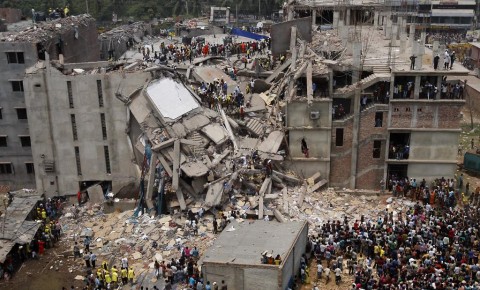by Admin | Aug 8, 2013 | Highlights
Fast Retailing Joins Inditex, H&M’s Bangladesh Safety Accord

A tag with Fast Retailing Co.’s Uniqlo logo is displayed on a sweater at the company’s store in the Ginza district of Tokyo. Credit- Bloomberg
Fast Retailing Co. (9983), Asia’s largest clothing retailer, joined Inditex SA (ITX) and Hennes & Mauritz AB (HMB) in signing an accord to improve factory safety in Bangladesh after an April garment complex collapse killed more than 1,000 people.
Fast Retailing has independently reviewed fire and building conditions at plants run by its partners in Bangladesh and detailed results are expected by November, it said in today’s statement.
Inditex and H&M, Europe’s two largest clothing retailers, signed the safety pact initiated by international organizations IndustriAll Global Union and UNI Global Union, after an eight-story garment complex collapsed in April in Bangladesh’s worst industrial disaster. The accord includes plans to survey all factories on related risks within the next two years and implement reforms to improve conditions, Fast Retailing said.
Seventeen North American retailers, including Gap Inc. and Wal-Mart Stores Inc., announced a separate five-year plan earlier in July to improve factory safety in the country.
About 70 percent of the Japanese retailer’s production comes from China with the rest coming from Southeast and South Asian countries, including Bangladesh, Keiji Furukawa, the company’s spokesman, said today. The company plans to reduce the percentage of clothes it produces in China to about two-thirds as it seeks to diversify risks and improve efficiency, he said. None of the company’s suppliers or workers were involved in the April building collapse, Furukawa said.
by Admin | Aug 5, 2013 | Highlights
President and CEO of Fair Trade USA, Paul Rice, argues that increasing threats to worker safety are because businesses are forgetting their social responsibility. “Putting people back into business,” might be as (if not more) necessary as reforming legislation and mobilizing consumer support. Rice identifies three key points that business leaders should bear in mind in order to ensure sustainable business practices.

Credit-www.fastcoexist.com
Why Social Sustainability Should Be Part Of Every Business?
I can’t think of anything that illustrates the human cost of doing business more than the tragedy this past April in Bangladesh. More than 1,100 men, women, and children died when the Rana Plaza building, which housed a number of garment factories, collapsed. Most were garment workers who were ordered by supervisors to report to work, even after inspectors deemed the building unsafe.
Millions of people around the world work in dangerous and unhealthy conditions, earning a nominal income to deliver the products we consume. While the factory collapse in Bangladesh is a terrible tragedy, it’s another wake-up call that business leaders need. We can no longer ignore the human side of our global supply chains. Now is the time for all of us to recognize and embrace social sustainability–much in the same way we’ve focused on environmental sustainability for the past 20 years–as a mission-critical way of doing business. By social sustainability, I mean investing in the livelihoods of farm and factory laborers, ending worker exploitation, and ensuring that there is ethical sourcing behind the things we buy.
Some of you might be thinking that social sustainability is a phrase made up of feel-good buzz words. But social sustainability is good business.
Here are three key points that every business leader should keep top-of-mind:
SOCIAL SUSTAINABILITY MITIGATES RISK
Simply put, ignoring social sustainability is a liability–to both your brand and product quality–that businesses can no longer afford.
Case in point: apparel companies, especially those that had previously outsourced their manufacturing to Bangladesh, began scrambling for PR cover within days of the Rana Plaza collapse. Earlier factory tragedies involving global corporations resurfaced as well, demonstrating the prominence of these issues in the eyes of the media and consumers.
Similarly, businesses risk product quality by ignoring the social side of sustainability. In the last month alone, the FDA issued recalls or safety alerts regarding food products tainted by salmonella, listeria and hepatitis A–contaminations that typically start in the fields where farm workers could be more vigilant if they were trained and empowered to do so. Not only do these outbreaks create a serious threat to public health, they can also cost food manufacturers millions of dollars to remedy each incidence of food-borne illness.
Investing in social sustainability allows companies to flip these types of liabilities into assets. When you provide safer working conditions, living wages, and job security, you create a more secure supply chain. When you give farm workers a reason to care about food safety and pest contamination by giving them special training and higher pay, you go a long way in ensuring the integrity of your product.
CONSUMERS WANT SOCIALLY SUSTAINABLE PRODUCTS
We’re seeing the rise of the conscious consumer–people who are informed and engaged, and who care about the environmental and social impact of the products they buy.
Businesses are responding. West Elm, for example, is partnering with Craftmark, an organization that is part of the All India Artisans and Craftworkers Welfare Association, to bring locally sourced and handmade products to consumer markets around the world. Many rug importers and exporters are looking for products free of child labor, and they work with organizations like GoodWeave for quality control. And with some companies, like prAna, customers show support by looking for the Fair Trade Certified label on their clothing offerings.
Does all this transparency pay off? Absolutely. Conscious consumers are willing to spend a little bit more to know that the items they purchase are sweatshop-free, help the lives of the workers who made them, and build stronger communities.
SOCIAL SUSTAINABILITY HAS NEVER BEEN EASIER
The good news is that social sustainability has never been easier to practice. There is no lack of information, and no shortage of partners who can help you develop, implement and audit a business model that gets it right:
The Fair Labor Association conducted an in-depth investigation of factories in China operated by Foxconn, Apple’s biggest supplier. Both Apple and Foxconn have agreed to follow FLA guidelines to reduce working hours, protect pay, and improve working conditions.
United Farm Workers, Oxfam America, and Costco, in collaboration with many other organizations, have lent considerable muscle to develop and support the Equitable Food Initiative. One of the initial projects had California strawberry growers commit to training their workers and paying them higher wages as an incentive to practice a higher standard of food safety.
Green Mountain Coffee Roasters recently completed a two-year partnership with Fair Trade USA and USAID to educate small-scale coffee farmers in Brazil about environmental conservation and effective natural resource management.
By putting people back into business, we’re choosing a world where farmers and workers are able to fight poverty through better trading practices, work in safe conditions, and have access to adequate schooling, health care, and housing. When this happens on a large scale, social sustainability will no longer just be “good business,” it’ll be business as usual.

